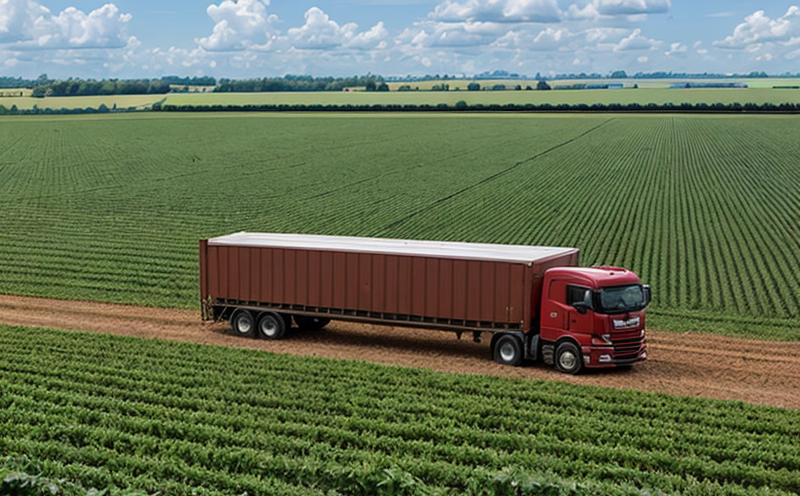Integrity Testing of Sealed Packages
The integrity testing of sealed packages is an essential component in ensuring the safety and quality of agricultural goods during transport and storage. This service focuses on verifying that the packaging materials are impermeable to gases, liquids, and other contaminants. It plays a critical role in maintaining the freshness and preventing spoilage of perishable items like fruits, vegetables, grains, and seeds.
Integrity testing is particularly important for agricultural goods due to their nature. These products can be highly sensitive to environmental changes such as temperature fluctuations, humidity levels, and exposure to contaminants. Proper packaging ensures that these conditions are maintained throughout the supply chain, from farm to table. The test involves subjecting sealed packages to various conditions designed to replicate real-world scenarios they might encounter during transportation or storage.
The testing process typically includes several steps: sample preparation, environmental chamber setup, and data collection and analysis. Samples are selected based on their typical packaging materials and expected transport routes. Environmental chambers allow for controlled exposure to specific conditions like temperature, humidity, pressure, and oxygen levels. Sensors within these chambers continuously monitor the integrity of the package under simulated transport scenarios.
Once testing is complete, results are analyzed using statistical methods compliant with ISO 12210-1:2018. These standards provide guidelines for determining whether a package maintains its integrity against specified criteria. Results can then inform decisions about improvements in packaging design or material selection. Properly conducted integrity tests help ensure compliance with international regulations, such as those outlined by the International Plant Protection Convention (IPPC).
For quality managers and R&D engineers involved in agricultural product development, understanding how to select appropriate testing methods is crucial. By leveraging this expertise, organizations can enhance their supply chain management practices, reduce waste, improve efficiency, and ultimately protect consumer health.
Why It Matters
The integrity of sealed packages directly impacts the quality and safety of agricultural goods throughout distribution channels. Poorly designed or manufactured packaging can lead to spoilage, contamination, and even legal issues if products do not meet regulatory standards. Ensuring package integrity helps maintain product freshness, extend shelf life, and comply with global food safety requirements.
By conducting comprehensive integrity tests before commercial release, companies demonstrate their commitment to sustainable practices by minimizing resource consumption and reducing waste associated with damaged or compromised packages. This approach supports both environmental sustainability goals and business continuity objectives.
- Enhanced Quality Assurance: Ensures that only high-quality products reach consumers.
- Regulatory Compliance: Meets stringent international standards for food safety and traceability.
Implementing robust integrity testing protocols also fosters trust between producers, distributors, retailers, and end users. Consumers appreciate knowing that they are purchasing fresh, safe products whenever possible.
Why Choose This Test
- Comprehensive Coverage: Our tests cover a wide range of packaging materials commonly used in agriculture, including plastic films, corrugated cardboard boxes, and multi-layered containers.
- Real-World Simulations: Packages are exposed to realistic conditions found during transit or storage, ensuring accurate representations of actual performance.
- Precision Instruments: Utilize advanced technology for precise measurement and analysis of package integrity.
- Compliance Assurance: Results align with relevant international standards like ISO 12210-1:2018, ensuring compliance with local and global regulations.
Our laboratory offers state-of-the-art facilities equipped to handle diverse packaging types and sizes. With experienced technicians and rigorous quality control measures, we provide reliable integrity testing services tailored specifically for agricultural goods transportation needs.
Environmental and Sustainability Contributions
The integrity of sealed packages has significant implications for environmental sustainability efforts within the agriculture sector. Improving package integrity reduces waste by preventing leaks that could contaminate soil or water sources near farms or during transport routes. Additionally, enhanced packaging performance contributes to more efficient use of resources such as energy and water in processing facilities.
By minimizing spoilage through better-sealed packages, less food is wasted overall, which benefits both economic efficiency and environmental health. Furthermore, reduced contamination risks associated with compromised containers help preserve natural ecosystems around farmlands.
- Reduces Food Waste: Ensures that more of the produce reaches consumers in good condition.
- Promotes Eco-Friendly Practices: Encourages less reliance on single-use plastics and other non-biodegradable materials.
Our commitment to integrity testing supports broader initiatives aimed at creating a greener future by prioritizing sustainable packaging solutions for agricultural goods. Through continuous improvement based on test results, we contribute positively towards global sustainability goals set forth by organizations like the United Nations Environment Programme (UNEP).





